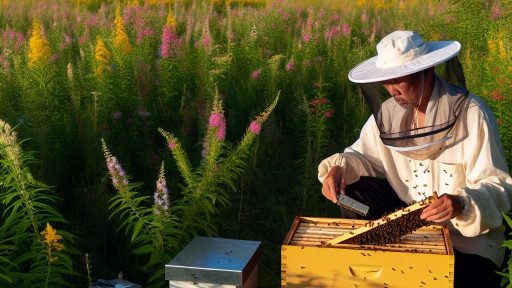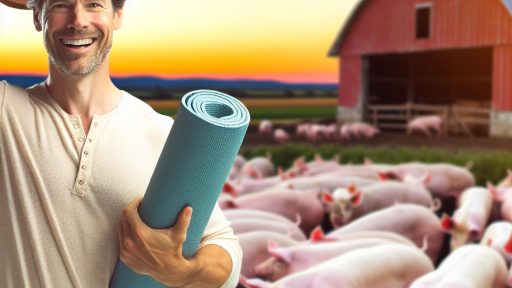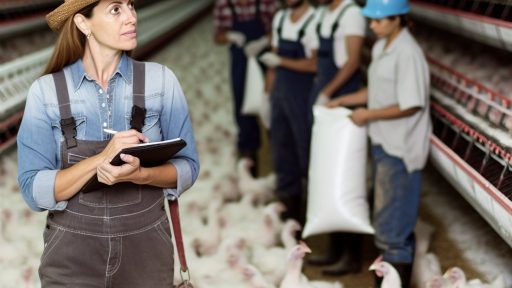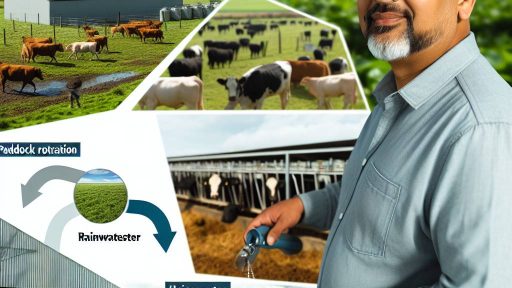Introduction to Organic Livestock Farming
Defining Organic Livestock Farming
Organic livestock farming prioritizes sustainable practices.
This method avoids synthetic chemicals and antibiotics.
Animals receive natural feed according to organic standards.
Furthermore, they enjoy ample outdoor access and pasture grazing.
Such practices promote animal welfare and biodiversity.
Importance of Organic Standards
Organic standards ensure that farming practices are ethical.
These standards vary by country but share common principles.
For example, they restrict harmful practices that damage ecosystems.
Additionally, organic certification builds trust among consumers.
This trust encourages further investment in sustainable methods.
Benefits of Organic Livestock Farming
Organic livestock farming enhances soil health and fertility.
It reduces the environmental impacts associated with conventional methods.
Moreover, it promotes the use of natural pest and disease controls.
Farmers can enjoy higher market prices for organic products.
This often translates to increased profitability for producers.
Transform Your Agribusiness
Unlock your farm's potential with expert advice tailored to your needs. Get actionable steps that drive real results.
Get StartedChallenges in Organic Livestock Farming
Transitioning to organic practices can pose challenges.
Farmers may face higher upfront costs for organic certification.
Additionally, they may encounter learning curves with new practices.
Persistent market competition can also threaten profitability.
However, many find long-term rewards outweigh these challenges.
Case Studies of Successful Organic Livestock Farms
Numerous farms have successfully implemented organic practices.
Sunny Meadows Farm exemplifies a thriving organic system.
Located in Vermont, they focus on pasture-raised poultry and cattle.
Their commitment to sustainability has garnered community support.
Another example is Green Pastures Farm in California.
They operate a diversified ranch with various organic livestock.
Both farms demonstrate that organic farming can be profitable.
Benefits of Regenerative Practices in Organic Livestock
Enhancing Soil Health
Regenerative practices significantly improve soil health.
This approach boosts the soil’s nutrient content.
Additionally, it enhances its structure and water-holding capacity.
Healthy soils lead to better forage quality.
As a result, livestock nutrition improves dramatically.
Promoting Biodiversity
Regenerative livestock farming encourages biodiversity.
This method incorporates diverse animal breeds into farming systems.
Such diversity mitigates disease risks among livestock.
Furthermore, it supports a wider variety of ecological interactions.
Healthy ecosystems function better and are more resilient.
Improving Animal Welfare
Animal welfare is a priority in regenerative farming.
Livestock are raised in more natural and stress-free environments.
Showcase Your Farming Business
Publish your professional farming services profile on our blog for a one-time fee of $200 and reach a dedicated audience of farmers and agribusiness owners.
Publish Your ProfileThis practice enhances animal well-being and productivity.
Healthy animals contribute to a more sustainable farming system.
Therefore, both ethical and economic benefits emerge.
Reducing Carbon Footprint
Regenerative practices help lower carbon emissions.
Improved soil health sequesters carbon effectively.
Additionally, livestock can contribute to carbon cycling.
Thus, this method combats climate change.
Every step taken in regenerative farming leads to a healthier planet.
Increasing Farm Resilience
Regenerative practices enhance farm resilience to climate change.
Healthier soils retain moisture better during droughts.
Additionally, diverse species can withstand pest outbreaks.
Farmers experience less financial risk due to these benefits.
Ultimately, this approach supports long-term food security.
Key Principles of Organic Livestock Farming
Holistic Management
Organic livestock farming embraces holistic management principles.
This approach considers the entire ecosystem, rather than just individual animals.
Farmers utilize ethical practices to enhance animal well-being.
Moreover, holistic management helps maintain healthy soil and biodiversity.
Animal Welfare
Animal welfare plays a vital role in organic livestock farming.
Farmers provide ample space and comfort for their animals.
These practices promote natural behaviors and reduce stress.
Consequently, this improves overall animal health and productivity.
Nutritional Feeding
Proper nutrition is essential for organic livestock.
Farmers prioritize high-quality, organic feed for their animals.
Additionally, they avoid synthetic additives and genetically modified organisms.
This practice enhances food safety and supports animal growth.
Environmental Responsibility
Organic livestock farming emphasizes environmental responsibility.
The focus lies on sustainability and resource conservation.
Farmers implement practices that minimize pollution and waste.
Furthermore, they promote soil health through rotational grazing.
Biodiversity and Ecosystem Health
Maintaining biodiversity is a key principle of organic practices.
Diverse species contribute to a balanced ecosystem.
Farmers integrate crop and livestock systems for better resilience.
This approach enhances natural pest control and nutrient cycling.
Organic Certification Standards
Adherence to organic certification standards is crucial.
Farmers must meet rigorous regulatory requirements.
This ensures products are truly organic and ethically produced.
Additionally, certification builds consumer trust in organic products.
Uncover the Details: Grazing Systems for Improving Forage Growth and Soil Fertility
Sustainable Feed Sources for Organic Livestock
Importance of Quality Feed
Quality feed is essential for healthy livestock.
It directly impacts growth and productivity.
Showcase Your Farming Business
Publish your professional farming services profile on our blog for a one-time fee of $200 and reach a dedicated audience of farmers and agribusiness owners.
Publish Your ProfileMoreover, it influences the overall health of animals.
Types of Sustainable Feed
Farmers should consider various sustainable feed sources.
- Organic grains such as corn and barley offer nutritious energy.
- Legumes like alfalfa provide protein-rich options.
- Pasture-based feeding enhances animal welfare and grass health.
Utilizing By-products
By-products from other industries serve as valuable feed sources.
For instance, brewery waste can be a great energy source.
Furthermore, food scraps can be repurposed for livestock diets.
Locally Sourced Feed
Locally sourced feed reduces transportation emissions.
It supports local economies and fosters community relationships.
Additionally, it often provides fresher options for livestock.
Seasonal Feed Management
Seasonal management of feed aids in sustainability.
Farmers can rotate feed sources based on seasonal availability.
This practice ensures that livestock always have nutritious options.
Integrating Crop and Livestock Systems
Integrating crops with livestock farming enhances sustainability.
Crops can provide feed while livestock contribute manure for fertilization.
This closed-loop system creates a more resilient farming approach.
Discover More: Pasture Rotation Strategies for Sustainable Livestock Farming
Animal Welfare Standards in Organic Farming
Importance of Animal Welfare
Animal welfare is a fundamental principle of organic farming.
It focuses on ensuring that animals lead healthy and natural lives.
Moreover, welfare standards improve the overall quality of farm products.
Healthy animals contribute to a sustainable farming system.
Key Welfare Standards
Organic farming adheres to strict animal welfare guidelines.
These guidelines promote humane treatment and natural behaviors.
The following are essential standards for animal welfare:
- Animals must have access to outdoor spaces.
- They need to engage in natural behaviors.
- Diet should consist of organic feed without harmful additives.
- Proper healthcare should be available, emphasizing prevention.
Benefits of High Welfare Standards
High welfare standards generate numerous benefits.
Firstly, they enhance the quality of meat, milk, and eggs.
Secondly, healthier animals can increase productivity.
Additionally, consumer demand for ethical products rises.
This shift leads to better market prices for organic farmers.
Challenges in Implementing Welfare Standards
Despite their benefits, challenges exist in maintaining these standards.
Financial constraints may limit some farmers’ ability to comply.
Furthermore, accessing organic feed can be difficult.
Additionally, training for proper animal handling is essential.
Strategies for Improvement
Farmers can adopt several strategies to improve welfare standards.
Continued education on animal husbandry is crucial.
Collaboration with veterinary professionals can enhance animal care.
Furthermore, networking with other organic farmers fosters knowledge sharing.
Utilizing available resources can streamline compliance with welfare practices.
See Related Content: Implementing Climate-Resilient Solutions For Organic Livestock Management
Soil Health and its Importance in Regenerative Livestock Systems
Understanding Soil Health
SoiI health refers to the quality and condition of soil.
It directly impacts plant growth and ecosystem functions.
A healthy soil contains a balance of minerals, organic matter, and living organisms.
Showcase Your Farming Business
Publish your professional farming services profile on our blog for a one-time fee of $200 and reach a dedicated audience of farmers and agribusiness owners.
Publish Your ProfileMoreover, it provides essential nutrients to crops and livestock.
Impacts of Soil Health on Livestock
Healthy soil contributes to the nutritional value of forage.
Consequently, livestock receive better nutrition from high-quality pastures.
Additionally, strong soil structure supports plant root systems effectively.
This improves water infiltration, reducing erosion risks.
Regenerative Practices to Enhance Soil Health
Implementing regenerative practices boosts soil health significantly.
These methods include cover cropping, crop rotation, and reduced tillage.
Cover cropping protects soil from erosion during off-seasons.
Crop rotation disrupts pest cycles and enhances soil microbes.
In addition, reduced tillage preserves soil structure and organic matter.
Benefits of Healthy Soil in Regenerative Systems
Healthy soil fosters biodiversity essential for ecosystem resilience.
It enables a sustainable cycle of nutrients and organic materials.
Furthermore, it increases carbon sequestration, combating climate change.
Lasting benefits include improved crop yields and enhanced animal welfare.
Significance of Prioritizing Soil Health
Prioritizing soil health is crucial for successful regenerative livestock systems.
Healthy soil enhances agricultural resilience and sustainability.
Ultimately, investing in soil health ensures long-term productivity and environmental health.
Explore Further: Remote Sensing in Precision Livestock Farming for Improved Feed Management
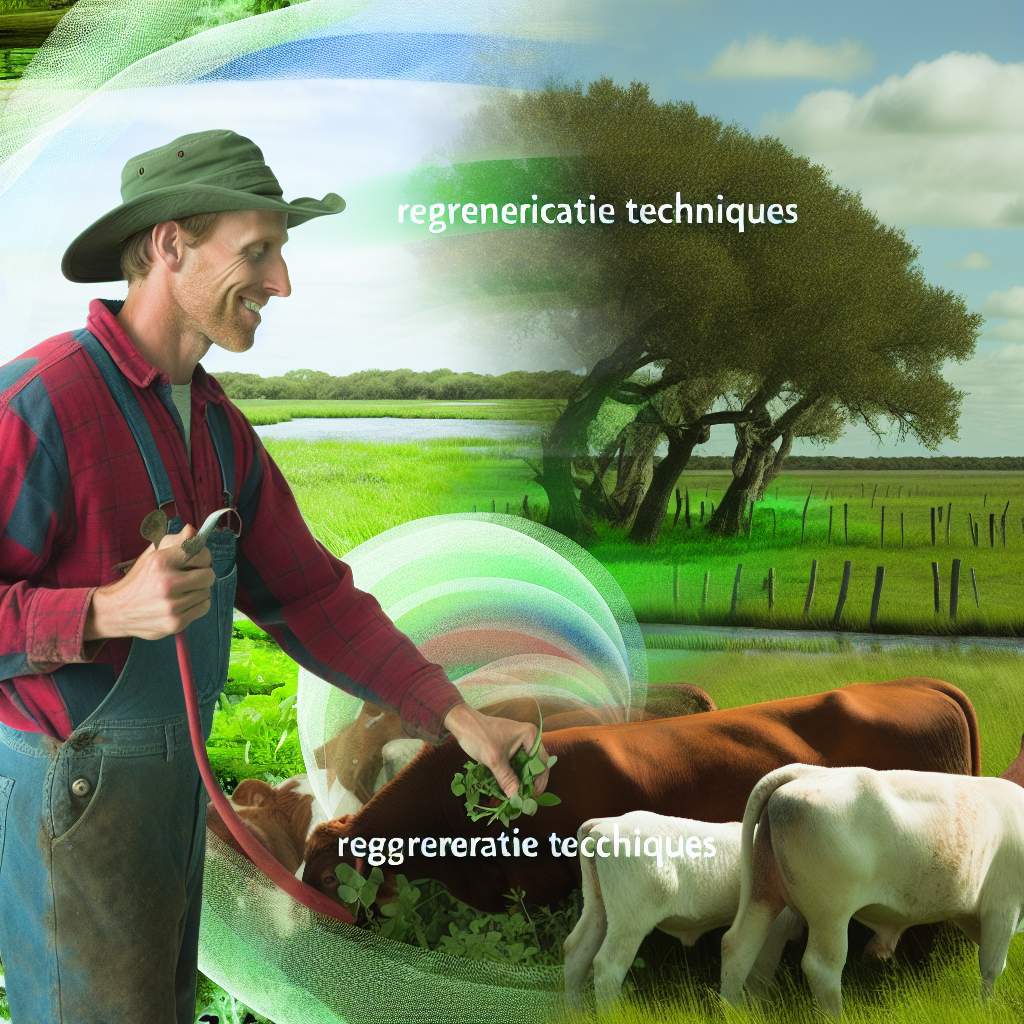
Pest and Disease Management in Organic Livestock Farming
Understanding the Challenges
Pests and diseases pose significant threats to organic livestock farming.
An effective management strategy is crucial for maintaining animal health.
Organic livestock are especially susceptible to various diseases.
Consequently, farmers must implement proactive measures for pest management.
Integrated Pest Management Strategies
Integrated pest management (IPM) combines various control techniques.
This approach minimizes chemical use while promoting animal welfare.
Farmers should begin by monitoring pest populations regularly.
Identifying pests early can prevent a larger outbreak.
Additionally, biological controls offer sustainable solutions.
Utilizing Beneficial Organisms
Encouraging beneficial insects can help control harmful pests.
For instance, ladybugs and lacewings can manage aphid populations.
Moreover, farmers can introduce predatory mites for mite control.
This method reduces reliance on chemical pesticides.
Cultural Practices to Enhance Resistance
Implementing diverse cropping systems can enhance disease resistance.
Crop rotation minimizes the chances of pest establishment.
Furthermore, maintaining proper hygiene reduces disease spread.
Cleansing feeding and watering equipment regularly is essential.
Natural Remedies for Disease Control
Employing natural remedies is integral to organic farming practices.
Herbal treatments can support animal health and prevent infections.
For example, garlic and oregano oil have antimicrobial properties.
Furthermore, probiotics can enhance the livestock’s immune system.
Vaccination and Regular Health Checks
Vaccination is a critical tool in preventing diseases in livestock.
Showcase Your Farming Business
Publish your professional farming services profile on our blog for a one-time fee of $200 and reach a dedicated audience of farmers and agribusiness owners.
Publish Your ProfileRegular health checks help identify any health issues early.
Farmers should keep accurate health records for all animals.
This practice ensures timely interventions and treatments.
Collaboration with Veterinary Experts
Consulting with veterinary professionals enhances disease management.
These experts provide valuable insights into animal health issues.
Farmers can develop tailored health plans based on expert advice.
Regular veterinary visits facilitate necessary vaccinations and health checks.
Adapting to Environmental Changes
Climate change impacts pest and disease dynamics considerably.
Farmers must adapt their strategies to changing environmental conditions.
This includes being aware of emerging diseases in livestock populations.
Continual education on best practices is imperative for success.
Case Studies of Successful Organic Livestock Farms
The Green Pastures Farm
The Green Pastures Farm has transformed its operations through organic principles.
It specializes in raising poultry and goats in natural settings.
Farmers Mary and Tom Thompson prioritize soil health and animal welfare.
They adopt rotational grazing to enhance pasture growth.
This method increases biodiversity while reducing pests.
Moreover, they produce high-quality organic meat sold locally.
Consequently, the farm strengthens community ties and local economies.
Sunrise Meadows Organic Ranch
Sunrise Meadows Organic Ranch showcases innovative practices in livestock management.
Owner Lisa Green implements a pasture-based system for cattle and sheep.
This system allows animals to roam freely and graze naturally.
Additionally, Lisa utilizes cover crops to improve soil fertility.
These crops enhance nutrient cycling and support livestock health.
Her ranch stands as a model for sustainable livestock farming.
Earth Harmony Farms
Earth Harmony Farms focuses on holistic management approaches.
Founded by John and Emily Carter, it integrates poultry and cattle effectively.
The Carters emphasize the importance of local ecosystems.
They practice agroforestry, combining trees with pastureland.
As a result, the farm improves carbon sequestration and habitat diversity.
The Carters also offer educational workshops for aspiring farmers.
This initiative fosters knowledge sharing within the community.
Happy Trails Homestead
Happy Trails Homestead embraces permaculture principles for livestock farming.
Owners Sarah and David Lee raise pigs and chickens on their land.
They prioritize regenerative practices that renew the land.
This approach enhances soil health and supports nutrient-rich crops.
The homestead becomes a haven for wildlife and diverse farm life.
Additionally, Sarah and David sell their products at local markets.
They build strong relationships with their customers through education and transparency.
Willow Creek Livestock Farm
Willow Creek Livestock Farm is known for its innovative breeding programs.
Owner Raj Patel focuses on heritage breeds that thrive in local environments.
Showcase Your Farming Business
Publish your professional farming services profile on our blog for a one-time fee of $200 and reach a dedicated audience of farmers and agribusiness owners.
Publish Your ProfileThese breeds require fewer inputs while providing quality products.
Furthermore, Raj integrates organic feed and natural supplements.
This strategy promotes health and resilience among his livestock.
Visitors to the farm often learn about breed preservation efforts.
Raj’s farm serves as an educational resource for sustainable agriculture.
Challenges and Solutions in Implementing Organic Practices
Common Challenges
Organic livestock farming presents several significant challenges.
One major issue is the higher cost of organic feed.
Farmers often struggle to find affordable organic feed options.
Furthermore, transitioning to organic methods requires extensive knowledge.
This transition period can be financially burdensome for farmers.
Pests and diseases also pose a challenge in organic systems.
Without synthetic pesticides, managing these threats demands creativity.
Additionally, regulatory compliance can be complex and time-consuming.
Practical Solutions
Farmers can explore multiple strategies to overcome these challenges.
Networking with local organic suppliers fosters better feed access.
Collaborative purchasing with other farmers can reduce costs.
Engaging in continuous education enhances knowledge and skills.
Participating in workshops helps farmers learn new management techniques.
Implementing integrated pest management is crucial for success.
This strategy uses biological controls and cultural practices effectively.
Moreover, staying updated on regulations ensures compliance and eases transitions.
Utilizing organic certification resources can simplify the regulatory process.
Long-Term Benefits
Despite the challenges, organic practices offer numerous long-term benefits.
They enhance soil health, leading to more sustainable farming ecosystems.
This approach fosters greater biodiversity on the farm.
Farmers may also benefit from premium prices for organic products.
Additionally, consumer demand for organic products continues to grow.
Finally, organic livestock farming promotes animal welfare and ethical practices.
Future Trends in Organic Livestock Farming for Sustainability
Emphasizing Animal Welfare
Animal welfare remains a significant focus in organic livestock farming.
Farmers prioritize humane treatment in daily operations.
Moreover, enhancing living conditions helps improve livestock health.
Integrating Technology
Technology is transforming organic livestock management.
Farmers now utilize innovative tools for better monitoring.
Data analytics optimize feed efficiency and health management.
Consequently, technology adoption leads to increased productivity.
Utilizing Regenerative Practices
Regenerative practices promote ecosystem health in farming.
Cover cropping and rotational grazing benefit soil and animal health.
These methods foster biodiversity and improve water retention.
Focus on Local Markets
Local markets play a critical role in organic livestock sales.
Farmers can better connect with consumers through direct sales.
Showcase Your Farming Business
Publish your professional farming services profile on our blog for a one-time fee of $200 and reach a dedicated audience of farmers and agribusiness owners.
Publish Your ProfileAdditionally, local sourcing reduces transportation emissions.
This shift strengthens regional economies and communities.
Promoting Education and Awareness
Education fosters greater understanding of sustainable practices.
Workshops and community events increase awareness among consumers.
Furthermore, sharing success stories inspires other farmers.
Ultimately, knowledge exchange elevates the entire industry.
Additional Resources
American Farmland Trust’s New England Farmer Microgrants …
Rodale Institute – Global Leaders in Organic Agriculture Research

